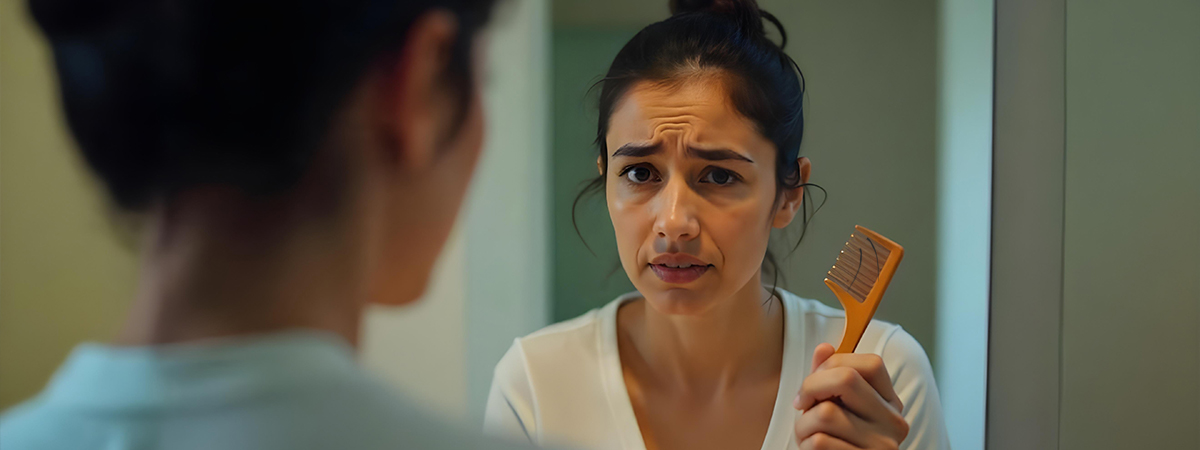How Stress Affects Your Hair: Understanding Hair Loss and Recovery
Stress doesn’t just reside in your mind. It can take a toll on your body and your hair. It may be because of a busy lifestyle, trauma, or emotional stress, but sudden hair fall caused by stress can leave you feeling alarmed and confused. But there’s hope. Hair loss can be reversed, and in most cases, your hair and confidence can be restored. Let us delve into how stress affects your hair, how to reverse its effects, and the times when you may need to consider professional help, such as a transplant from reputable clinics like LaDensitae, Hair Transplant Clinic in Mumbai.
The Science Behind Stress and Hair Loss
When you’re stressed, your body produces hormones such as cortisol that can interfere with your regular hair growth cycle. This may be able to move a large number of hairs from the growth (anagen) phase to the resting (telogen) phase. These hairs will fall out after a few weeks or a few months (a condition called telogen effluvium). It is one of the most frequent reasons for stress hair loss recovery cases I observe in my clinics.
What Effects Does Stress Have on Your Hair Follicles?
Your hair follicles are like little factories. When your body is stressed, those factories slow down, or they shut down entirely. This distinction has a disruptive effect on hair growth and hair fall. Elevated cortisol levels may also limit the amount of nutrients that reach your scalp, further exacerbating the issue. Over time, if neglected, it can result in long-term injuries, and hair-thinning remedies might be critical in addressing severe damage.
Various Stress-Induced Hair Loss Formats
Your hair isn’t affected by all stress equally.
Telogen Effluvium: The Most Common Type
This occurs when stress forces many hairs into a resting phase. After 2–3 months, you’ll begin to notice shedding, particularly when you brush or wash your hair. However, the good news is that recovery from hair loss is possible.
Trichotillomania-Pulling a Hair Out Due to Stress
Some people cope with stress by pulling their hair out. This is a psychological illness and needs behavioral therapy. Early treatment is beneficial for recovering from stress-induced hair loss in these situations.
Alopecia Areata: When Your Body Turns on Itself
Long-term stress can confuse your immune system, which may mistakenly attack healthy hair follicles. This causes smooth, circular balding. The condition, although scary, typically responds well to treatment, particularly when paired with remedies for anemia and hair loss recovery.
Signs That Stress Is Bothering Your Hair Fall
And if you’re that person suddenly losing hair and can’t figure out why, stress can be one of the causes. Look for these signs:
Sudden Hair Loss Affects Entire Head
You might find clumps in your shower drain or on your pillow.
No Scalp Damage or Redness
Stress-related loss, however, doesn’t tend to cause irritation or scarring, as infections or scalp illnesses do.
How To Properly Diagnose Stress Hair Loss
Before you begin Hair Thin Analysis (HTA), a formal diagnosis is the first step in hair thinning recovery. Blood tests can also look for low iron, thyroid problems, and vitamin deficiencies that may be contributing to hair loss.
Significance of Practice of Anaemia Testing
Iron deficiency can accelerate shedding. For women in particular, this is normal. Correcting iron levels is instrumental in reversing anaemia and hair loss.
Reasons to Consult a Hair Expert
Trichologists and dermatologists can analyze your scalp and guide you to the next real steps. Most of the patients of LaDensitae tell us that this first step is very reassuring and empowering.
Professional Treatments for Faster Recovery
“Home care isn’t always enough — especially when your hair follicles are really damaged,” he said.
Try PRP Therapy
Injections of platelet-rich plasma feed follicles and speed up regrowth. They are also considered safe and quite popular for hair thinning recovery.
Apply Topical Treatments such as Minoxidil
Reboot the growth cycle with another over-the-counter medication. It works for both men and women.
When You Should Think About Getting a Hair Transplant
If the patches on your scalp don’t improve with other treatments, transplantation may be an option. Facilities such as LaDensitae offer specially designed long-term hair loss recovery plans that naturally restore volume and density.
Emotional Effects of Hair Loss—and the Comeback
When you start to lose hair due to stress, it’s not only a change in your appearance; it also has a significant impact on your mood, confidence, and self-esteem. But regrowth means more than just strands — it’s joy, solace, and a return to normalcy.
Tips on how to Avoid Stress Hair Loss in the Future
- Get enough sleep and stay hydrated
- Don’t use harsh shampoos and hot styling tools
- Unplug and relax every single day
Engaging in these practices will help maintain your hair’s health and establish long-term habits that promote recovery from hair thinning.
Conclusion
Stress doesn’t have to steal your hair away forever. When you understand the connection between stress and hair loss, you can take action. There are options today — from changes in lifestyle to complex treatments, you can recover. All it takes is to act early, be relentless, and enlist expert help when necessary.
Answered by experts
answered by experts
Frequently Asked Questions
Is stress a possible cause of permanent hair loss?
How fast does hair grow back after stress?
Does iron deficiency exacerbate it?
Does a clinic like LaDensitae help with hair loss?
What if I have bald spots?
Are You Ready to Regrow with Confidence?
Get a free hair health check at LaDensitae. Call it visiting today at the Vikings. From mild shedding to dramatic hair loss, our team of tailors creates a personalized, stress-free hair loss recovery plan tailored to your needs. Schedule your consultation on Hair Transplant in Mumbai now and get started on feeling like yourself again.











